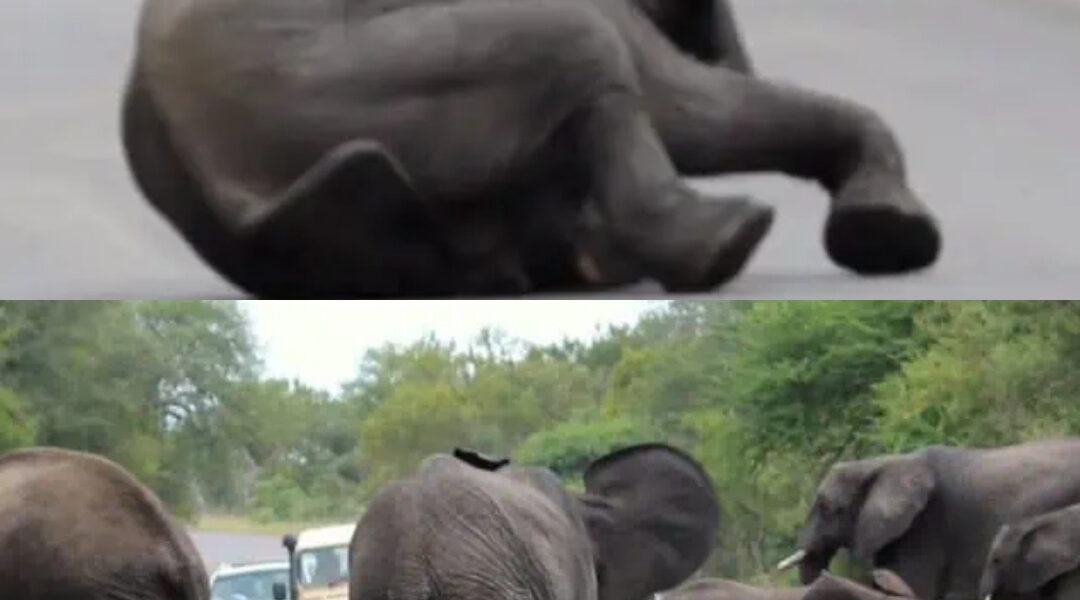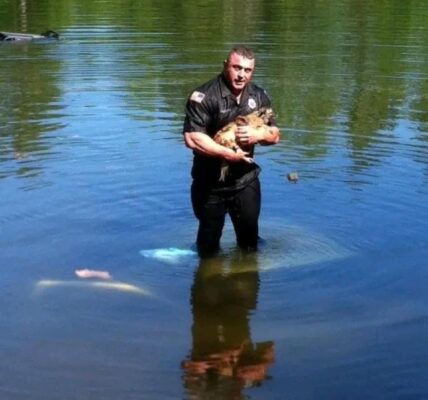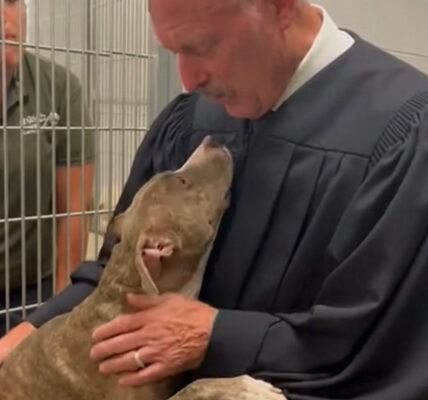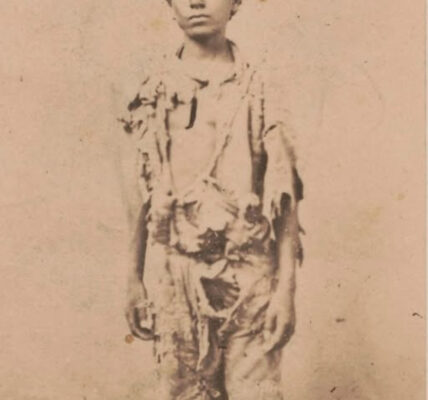Dawn had only just begun to stretch across the savannah when the moment unfolded—quiet, ordinary, almost unnoticeable. The sun cast long golden shadows over Kruger National Park, the air smelled of dust and warm grass, and a line of cars moved slowly along one of the park’s busiest roads. Tourists leaned out of windows with cameras ready, hoping to glimpse the wildlife that made this place sacred.
No one could have predicted what they were about to witness.

It began with a small shape stumbling out of the brush. A young elephant calf—tiny by elephant standards, probably only a few months old—took its first hesitant steps onto the paved road. Its legs wobbled, its ears twitched nervously. The herd was nearby, but just out of view. For a moment, everything looked normal.
Then the calf slipped.
One second, it was standing. The next, its front legs folded awkwardly and its body collapsed onto the hot asphalt. A soft, frightened cry echoed across the silence.
Cars stopped abruptly.
Engines clicked off.
People leaned forward, breath held, unsure of what they were seeing.

The calf struggled once, twice—its legs flailing in helpless circles. But it was too small, too weak, too startled. Finally, it simply lay there on its side, chest heaving, trunk limp against the ground.
And the entire world seemed to pause with it.
A baby elephant had fallen.
And in that moment, nothing else mattered.
The Gathering of Giants
Before fear could take root, the bushes behind the calf rustled. A shadow moved. Then another. And then, emerging like ancient guardians called by instinct itself, came the towering shapes of adult elephants.
The matriarch appeared first.
Massive, calm, steady—her presence alone felt like the earth had decided to stand up and protect its own. Without hesitation, she marched onto the road, placing herself between the calf and any danger.

She did not need to trumpet.
She did not need to look back.
The herd understood.
One by one, elephants of all sizes stepped forward, forming a circle around the fallen calf—a wall of solid gray bodies, trunks swaying gently, ears extended as if ready to shield the little one from the world.
Traffic came to a standstill.
But no one complained.
Every person watching knew they were witnessing something sacred.
Inside the circle, the matriarch leaned down and nudged the calf with her trunk—softly, tenderly, as a mother would wake a sleeping child.
But the calf didn’t rise.

It trembled, legs splayed awkwardly across the road. Whether from exhaustion, fear, or a simple misstep, it could not stand. Its tiny cries broke the morning air, fragile and heartbreaking.
And that was all the herd needed.
Love in Motion
Elephants are known for strength.
For memory.
For wisdom.
But what unfolded next showed their greatest trait of all:
Compassion.
Two females stepped forward first. They knelt beside the calf, using their trunks to stroke its back, offering comfort through touch—the same way elephants soothe their young after a scare.
Another adult took position behind the calf, placing her front foot gently along its back leg, as if encouraging it to push upward.

The matriarch nudged again, firmer this time.
Then again.
Not out of frustration, but determination.
They would not leave this road without the calf standing.
Minutes passed.
The world watched, silent.
A ranger observing from his truck whispered into his radio:
“They’re helping the little one. They’re not giving up.”
The calf tried again.
Its legs shook violently.
Its head bobbed.
It collapsed back onto its belly.
But the herd didn’t move away.
They tightened their circle.
They raised their trunks like protective banners.
They hummed low, vibrating notes—sounds elephants use for comfort, reassurance, and unity.
If love had a sound, it would have been that gentle rumble echoing across the asphalt.

A Victory Measured in Inches
At last, after what felt like forever, the calf gathered its strength and tried to rise once more.
This time, the herd leaned in closer.
A gentle push from the matriarch.
A soft nudge from another.
A stabilizing trunk beneath its chin.
And then—
A miracle in the shape of four tiny legs.
The calf stood.
Wobbly, uneven, trembling—but standing.
The adults trumpeted—not loudly, but proudly, a warm celebration that rolled across the plains like rising thunder.
The calf took its first steps off the road, guided by the steady presence of its family. With each movement, the elephants created a clearing, ensuring no car, no danger, no noise could frighten it again.
Slowly, gracefully, the herd escorted the little one back toward the safety of the trees. Only when the calf was deep within the bush did they turn and face the road again, as if giving permission for the world to continue turning.
Traffic resumed.
Engines hummed back to life.
But something had changed.
Every person who watched knew they had been given the privilege of seeing something few humans ever do—the unspoken, unbreakable promise elephants make to each other:
No one gets left behind.
A Lesson from the Giants
When the video reached the internet, thousands watched in awe. Comments poured in from around the world:
“Elephants love bigger than we understand.”
“I wish humans protected each other the way they do.”
“This brought me to tears.”
And it did.
Because the sight of a herd stopping everything—time, danger, fear itself—to lift one small, helpless life was more than heartwarming.
It was a reminder.
That family does not abandon its own.
That strength does not overshadow gentleness.
That even the giants of the earth kneel when someone smaller needs them.
In a world often rushed, fractured, and distracted, the elephants of Kruger offered a quiet truth:
Care is powerful.
Unity is instinct.
And love, even in the wild, can stop traffic.
For one small elephant, it was salvation.
For the rest of us, it was a story we will never forget.




